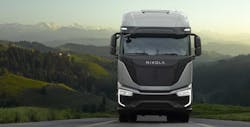German Logistics firm signs H2-powered Transportation deal with E.ON & Nikola
German logistics services provider Richter Group has partnered with clean transportation solutions provider Nikola and energy firm E.ON to decarbonize its heavy-duty fleet.
Under the deal, E.ON and Nikola will support Richter’s efforts by providing hydrogen electric trucks, the required green hydrogen, and the refuelling infrastructure through a joint venture (JV) that will be established soon.
As part of this collaboration, Richter has signed a letter of intent for an initial order of 20 20 Class 8, heavy-duty Nikola Tre hydrogen electric vehicles and the necessary green hydrogen to power them. The trucks are expected to be delivered in 2024.
Richter plans to transition its entire fleet of 160 trucks to Nikola Tre hydrogen electric trucks in the next four to five years. Additionally, it plans to work with its logistics partners to convert fleets to Nikola's zero-emission vehicles, which could result in an additional 750 hydrogen electric trucks within that same timeframe.
The Nikola Tre hydrogen electric trucks in the European 6x2 variant will be manufactured by a JV between Nikola and Iveco Group at a facility in Ulm, Germany. The vehicles will be available to be acquired through IVECO’s electric truck rental model, GATE. IVECO will also provide maintenance and service functions as part of this model.
E.ON will provide green hydrogen and develop the necessary refuelling infrastructure, with the first refuelling solution to be located at Richter’s premises in Wesel, Germany. Both hydrogen supply and logistics will be supplied though the Nikola-E.ON JV.
“This letter of intent is just the beginning,” Sylvio Richter, Founder and CEO of Richter Group, said. “Through our technology subsidiary Sundronix, Richter Group will be working with Nikola and E.ON on technological solutions for the design and construction of a 700-bar refuelling infrastructure, hydrogen transport logistics, and hydrogen supply."
More from EnergyTech on the role of H2 in Fleet Decarbonization
BNSF joins Bakken on Heartland Hub design
Many of these same companies are engaged in a transition to fleet electrification. With heavy-duty trucks and long routes, some believe hydrogen is best suited as a carbon-reduction fuel because of its energy density and shorter refueling periods.
The Nikola Tre hydrogen electric trucks have a range of up to 800 km, making it one of the zero tailpipe emission Class 8 trucks with the longest range currently available in the market. Moreover, it is said to provide weight-saving advantages over battery-electric Class 8 trucks that offer a similar range.
“The commitment from Richter Group is another example of how Nikola and E.ON are playing an essential role in helping Germany achieve the goal of decarbonizing the transportation sector,” Michael Lohscheller, President and CEO of Nikola, said. “Implementing the initial order of 20 heavy-duty zero-emission trucks in place of existing diesel trucks, equates to avoiding the annual CO2 emissions from approximately 600 passenger cars.”
About the Author
EnergyTech Staff
Rod Walton is head of content for EnergyTech.com. He has spent 17 years covering the energy industry as a newspaper and trade journalist.
Walton formerly was energy writer and business editor at the Tulsa World. Later, he spent six years covering the electricity power sector for Pennwell and Clarion Events. He joined Endeavor and EnergyTech in November 2021.
He can be reached at [email protected].
EnergyTech is focused on the mission critical and large-scale energy users and their sustainability and resiliency goals. These include the commercial and industrial sectors, as well as the military, universities, data centers and microgrids.
Many large-scale energy users such as Fortune 500 companies, and mission-critical users such as military bases, universities, healthcare facilities, public safety and data centers, shifting their energy priorities to reach net-zero carbon goals within the coming decades. These include plans for renewable energy power purchase agreements, but also on-site resiliency projects such as microgrids, combined heat and power, rooftop solar, energy storage, digitalization and building efficiency upgrades.
